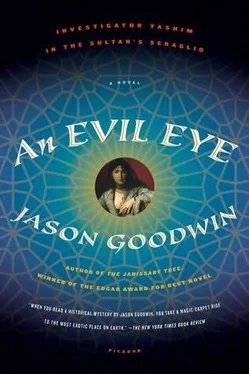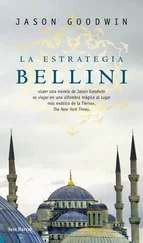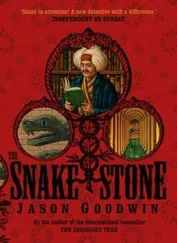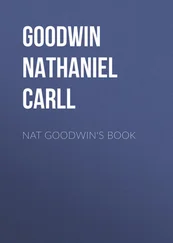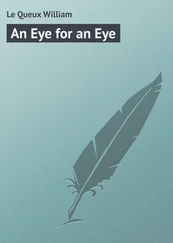Jason Goodwin - An Evil eye
Здесь есть возможность читать онлайн «Jason Goodwin - An Evil eye» весь текст электронной книги совершенно бесплатно (целиком полную версию без сокращений). В некоторых случаях можно слушать аудио, скачать через торрент в формате fb2 и присутствует краткое содержание. Жанр: Исторический детектив, на английском языке. Описание произведения, (предисловие) а так же отзывы посетителей доступны на портале библиотеки ЛибКат.
- Название:An Evil eye
- Автор:
- Жанр:
- Год:неизвестен
- ISBN:нет данных
- Рейтинг книги:3 / 5. Голосов: 1
-
Избранное:Добавить в избранное
- Отзывы:
-
Ваша оценка:
- 60
- 1
- 2
- 3
- 4
- 5
An Evil eye: краткое содержание, описание и аннотация
Предлагаем к чтению аннотацию, описание, краткое содержание или предисловие (зависит от того, что написал сам автор книги «An Evil eye»). Если вы не нашли необходимую информацию о книге — напишите в комментариях, мы постараемся отыскать её.
An Evil eye — читать онлайн бесплатно полную книгу (весь текст) целиком
Ниже представлен текст книги, разбитый по страницам. Система сохранения места последней прочитанной страницы, позволяет с удобством читать онлайн бесплатно книгу «An Evil eye», без необходимости каждый раз заново искать на чём Вы остановились. Поставьте закладку, и сможете в любой момент перейти на страницу, на которой закончили чтение.
Интервал:
Закладка:
Yashim squatted down by the body, trying to see a division where the skin met the clothing. The man’s face was like a cauliflower streaked with pale hair: it told Yashim little. There were fair Muslims, and fair Christians; on balance, perhaps, more fair Christians. His skin had wrinkled in the long immersion under water, soft and ridged like the white brains of sheep laid out for sale in the butchers’ market. A line of tighter skin ran from the dark mass of the man’s mouth toward his eye, and the flesh had bulged over it. It looked like an old scar.
Yashim gritted his teeth and pushed his fingers quickly into the base of the man’s neck. He breathed shallowly, each breath bringing the sweet odor of decay into his mouth. The skin was soft. He made his mind a blank, working his fingers toward the nub of a stitched hem. As far as he could see, the man was wearing underclothes-a sleeveless vest and a pair of drawers. He felt a seam and dragged at it, loosening the cloth from the soft flesh that spilled over it.
From his belt Yashim drew a small knife, took hold of the triangle of cloth in his left hand, and slid the blade beneath it, working from the man’s neck along the top of his shoulder. The cloth parted easily.
As he worked to undress the corpse, he gagged: once he went back to the door and leaned against it, sweat prickling his eyes, to draw breath. The monk stood with his back to the doorway; only the mullah regarded him sorrowfully, the corners of his mouth firmly turned down in sympathy for Yashim’s plight. Yashim held up a hand to tell him to wait a little longer.
As he was cutting away the cloth along the man’s ribs, the arm rolled slowly back. Yashim stared for a few moments, frowning.
When it was done, he came out into the sunshine and felt instantly nauseated, the heat seeming to suck at his stomach, so that he heaved and retched.
The monk brought a basin and a clean cloth. Yashim scrubbed his hands.
“As far as I can tell, he was a Christian,” he said finally. He rinsed the knife and polished it hard on the cloth, until it gleamed, and stuck it back into his belt. “Fair-haired, uncircumcised. Not more than forty-maybe a lot younger. Fit, too. A big man.”
The concern on the mullah’s face faded slightly. “I am happy to accept your judgment, Yashim efendi. At prayers, I can tell the believers, and the hubbub will die down.” He turned to the monk. “I am glad, for all our sakes.”
At the gate Brother Palamedes peered through the peephole.
“There are still some men outside, mullah.”
“I will speak to them, then.” Mullah Dede stepped out into the sunshine.
“I’ll trouble you for a drink of water,” Yashim said.
In the kitchens, lit by high windows, the monks were preparing the evening meal. They looked at Yashim curiously, but said nothing. Brother Palamedes fetched him a beaker and filled it from a jug with a long spout.
Yashim accepted the beaker, then hesitated. “Not the same well?”
The monk shook his head, unsmiling. “This is from the inner well, efendi.”
Yashim drank. “There is one thing I do not understand, Brother Palamedes. May we speak, privately?”
The monk hesitated. “I can take you to my cell, efendi.”
The cells were built in two rows facing a narrow, sunless courtyard: as soon as he saw them Yashim recalled the apartments set aside for eunuchs in the imperial harem. Brother Palamedes’s cell contained a narrow bed, a desk, and a wooden stool. On the desk lay a thick book bound in cracked leather, with a flimsy notebook beside it. Beside the notebook lay a quill pen. A bottle of ink stood at the far corner of the desk, beside an earthenware jug and an empty glass. On the wall above the bed hung a crucifix mounted on wood, with a small plaque beneath it. There was nothing written on the plaque. The tiled floor glowed a dusky pink, worn into hollows by the passage of feet over many centuries.
“Who was he?”
The monk spread his hands. “Then xero.” I do not know.
“An utter stranger.”
“We live a secluded life, Yashim efendi, but of course this island is our home. The dead man is not a priest, nor a monk. He is not a Muslim or a Jew, as you have established. We know of no one of the faith-I mean, our faith-missing on the island, or indeed on any of the islands.”
“How did you bring him out of the well?”
“We made a sling of canvas. Brother Andrew guided the man’s body into the sling, and then we drew him up. And we put him where he is now.”
“Someone examined the body?”
Brother Palamedes puffed out his cheeks. “Examined? We could see he was dead.”
“We?”
“Brother Andrew and I laid the body on the floor.”
“And since then? Who else has seen the body?”
“I’m not sure what you mean, efendi. We sent to the governor, that’s all. We haven’t had a reply.”
“I understand. You laid the body on the floor, and since then no one has opened the door, until I came?”
“The body of a man is not a spectacle,” the monk replied, stiffly. “No one knew him.”
Yashim nodded, slowly. “You have not answered my question.”
The monk blinked. “Efendi?”
“Who saw the body, apart from you and Brother Andrew?”
Brother Palamedes wetted his lips. “I–I do not understand.”
“Your head may be weak-or not. But I think you have a strong stomach, brother.”
The monk was still.
“You cut a small patch off the man’s skin, from under his arm.”
Brother Palamedes sat down abruptly on the little bed. “I wanted-only-to avoid a scene,” he said in a small voice, folding his hands on his lap.
“A tattoo, perhaps?”
“Something like that.”
“Show me. Please.”
The monk shook his head. “I threw it away.”
Yashim bit his lip. His mouth felt dry. He reached for the earthenware jug.
Brother Palamedes snatched at the jug. “I will fetch some more water.”
But Yashim had already gripped the handle, and as the monk lunged he pulled away. Water slopped out of the mouth of the jug and splashed his wrist.
He splayed his fingers and tipped the jug upside down. The water cascaded onto the tiled floor.
When Yashim set the jug down, he was holding the flap of skin in his hand.
13
Brother Palamedes put his fingers across his face.
“Someone came to us, a week ago, maybe longer. Asking about a friend who had gone missing. I thought-perhaps…”
He trailed off.
Yashim said: “Someone? Ortodox?” He meant someone of the Orthodox faith, the usual description for a Greek: the empire recognized people by their confession, not their race.
The hesitation was momentary. “A type of Ortodox, yes.”
Yashim widened his eyes. “A type of Orthodox,” he echoed. It could mean Armenian, or Serbian. A glance at the monk’s face told him it was none of those. “Russian,” he said.
Brother Palamedes clasped his hands together. “Please, Yashim efendi. At Hristos we are men of the church. We do not seek the friendship of the Russians. Believe me. We welcome the friendship of all men but-we must be careful.”
Yashim glanced at the pale slip of skin lying on the table, and shuddered. For years, Russia had been stirring up the Greeks, encouraging them to rebellion, disturbing their age-old compact with the Ottoman state.
“Who did you intend to tell?”
The monk twisted his fingers in his lap. “No one. That is-we want no trouble, Yashim efendi. These days anything may be taken amiss. You understand.”
Yashim grunted. He picked up the monk’s pen and pushed the skin flat against the tabletop.
“It’s not a tattoo.”
“No, efendi. I do not know what it is. But a mark, of some kind.”
Читать дальшеИнтервал:
Закладка:
Похожие книги на «An Evil eye»
Представляем Вашему вниманию похожие книги на «An Evil eye» списком для выбора. Мы отобрали схожую по названию и смыслу литературу в надежде предоставить читателям больше вариантов отыскать новые, интересные, ещё непрочитанные произведения.
Обсуждение, отзывы о книге «An Evil eye» и просто собственные мнения читателей. Оставьте ваши комментарии, напишите, что Вы думаете о произведении, его смысле или главных героях. Укажите что конкретно понравилось, а что нет, и почему Вы так считаете.
